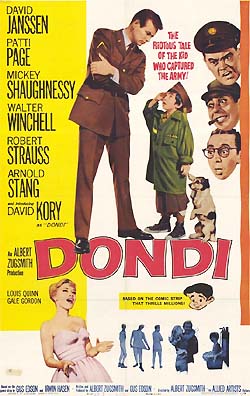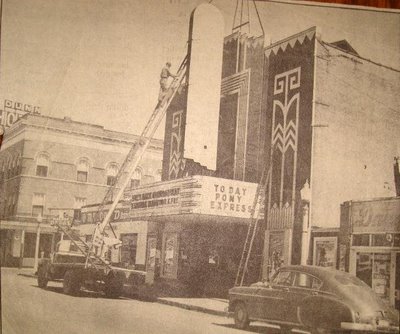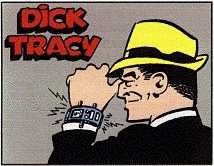 I first saw a movie in a theater in 1961. It was Dondi, a now-forgotten screen version of a now-forgotten comic strip about an adorable little war orphan who makes his circuitous way from Italy to the United States, there to have all manner of adventures and live happily ever after.
I first saw a movie in a theater in 1961. It was Dondi, a now-forgotten screen version of a now-forgotten comic strip about an adorable little war orphan who makes his circuitous way from Italy to the United States, there to have all manner of adventures and live happily ever after.
The film, which starred David Janssen, Arnold Stang, Patti Page, and Walter Winchell, appears to have sunk without trace. So did the strip, which ran from 1955 to 1986, at which time it was carried by a mere thirty-five newspapers. The only reason why I remember either one is because according to family legend, I was asked to leave the theater midway through the show. It seems that I was so excited by Dondi that I insisted on running up and down the aisle, which in 1961 was universally regarded as conduct unbecoming a filmgoer, even one who was, like me, just five years old.
Most films, however musty, surface on Turner Classic Movies sooner or later. When Dondi popped up there the other day, I made a point of recording it for future viewing, and last night I took an amused peek at my very first movie. Somewhat surprisingly, the first reel, in which poor little Dondi finds refuge from a snowstorm in a shabby-looking Army barracks, had a vaguely familiar look to me. Was it possible that the first few minutes of Dondi had impressed themselves on my memory? Surely not–and yet it’s true that I’ve retained a handful of other visual fragments of my pre-school days. Among other things, I clearly remember seeing Edward R. Murrow on Person to Person, a show that Murrow stopped hosting in 1959. If I can remember that, it’s well within the realm of possibility that I can also recall a snippet or two of Dondi, at least up to the point when Hodge Decker, the dapper manager of the Malone Theater, gave me the boot.
 The Malone, the movie house in Smalltown, U.S.A., where I saw Dondi, no longer exists. It was closed and torn down in 1985, a year before the comic strip bit the dust and eleven years after I moved away from the Missouri town where I grew up. I must have attended a fair number of Saturday matinees there, but the names of the other films that I saw have all faded from my memory. Nor do I have any sexy memories to share with you, for I was a pitifully slow learner when it came to women, and I don’t think I worked up the nerve to fondle anyone at the Malone other than tentatively.
The Malone, the movie house in Smalltown, U.S.A., where I saw Dondi, no longer exists. It was closed and torn down in 1985, a year before the comic strip bit the dust and eleven years after I moved away from the Missouri town where I grew up. I must have attended a fair number of Saturday matinees there, but the names of the other films that I saw have all faded from my memory. Nor do I have any sexy memories to share with you, for I was a pitifully slow learner when it came to women, and I don’t think I worked up the nerve to fondle anyone at the Malone other than tentatively.
As for Dondi, it’s not the worst picture I’ve ever seen, though only sentiment can explain why I watched the whole thing last night. As longtime readers of this blog know, I am one of those blessed creatures who had a largely happy childhood and who moved away from home not out of discontent but to seek out opportunities that were unavailable in a small Midwestern town. Had I taken my father’s advice and become a lawyer, I probably would have come back to Smalltown, settled down, made something of myself, and–like little Dondi–lived happily ever after.
 Or not: the small towns of America, it’s said, used to be full of unhappy misfits who frittered away their lives longing for that which they could never hope to have. This may well be true, but most everybody who lived in Smalltown when I was a boy seems to have managed to do so with a minimum of fuss, and those who couldn’t usually packed up and left. Nowadays, of course, the word “provincial” has lost most of its meaning and much of its sting, since we all live in the same electronic echo chamber. It’s as easy to watch Treme or download “Born This Way” in Smalltown as it is in Manhattan. But I can remember when it took at least a month for the movies I read about in Time to get to the Malone, and many of the ones that sounded most interesting never got there at all. Though network television had started to shrink the world in 1961, its effects were gradual and fitful. In those days placing a long-distance telephone call was still a big deal, and the only person in America who carried his own phone around with him was Dick Tracy.
Or not: the small towns of America, it’s said, used to be full of unhappy misfits who frittered away their lives longing for that which they could never hope to have. This may well be true, but most everybody who lived in Smalltown when I was a boy seems to have managed to do so with a minimum of fuss, and those who couldn’t usually packed up and left. Nowadays, of course, the word “provincial” has lost most of its meaning and much of its sting, since we all live in the same electronic echo chamber. It’s as easy to watch Treme or download “Born This Way” in Smalltown as it is in Manhattan. But I can remember when it took at least a month for the movies I read about in Time to get to the Malone, and many of the ones that sounded most interesting never got there at all. Though network television had started to shrink the world in 1961, its effects were gradual and fitful. In those days placing a long-distance telephone call was still a big deal, and the only person in America who carried his own phone around with him was Dick Tracy.
Was the world of my childhood better, worse, or just different? All of the above, I should think. Sometimes I wish I still lived there, but it goes without saying that I would have had to live in a place not unlike New York in order to do the things that I’d want to be doing now. I was, however, content to live in Smalltown in 1961, and almost as content in 1971. My mother and brother still live there, and I’ve yet to hear either one of them complain about it.
All in all, I think I was lucky to live there when I did, just as I was lucky to move to New York when I did. In fact, I think I’m a pretty lucky guy all around–even if I did get thrown out of the Malone Theater fifty years ago for running up and down the aisle.
